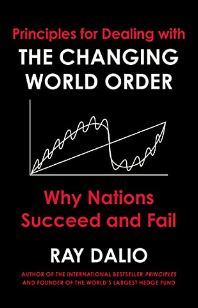The Reading Room

Principles for Dealing with the Changing World Order: Why Nations Succeed and Fail
Ray Dalio
Published: 2021, Avid Reader Press / Simon & Schuster
“A few years ago, Ray Dalio noticed a confluence of political and economic conditions he hadn’t encountered before. They included huge debts and zero or near-zero interest rates that led to massive printing of money in the world’s three major reserve currencies; big political and social conflicts within countries, especially the US, due to the largest wealth, political, and values disparities in more than 100 years; and the rising of a world power (China) to challenge the existing world power (US) and the existing world order. The last time that this confluence occurred was between 1930 and 1945. This realisation sent Dalio on a search for the repeating patterns and cause/effect relationships underlying all major changes in wealth and power over the last 500 years. Dalio brings readers along for his study of the major empires including the Dutch, the British, and the American, putting into perspective the “Big Cycle” that has driven the successes and failures of all the world’s major countries throughout history. He reveals the timeless and universal forces behind these shifts and uses them to look into the future, offering practical principles for positioning oneself for what’s ahead.”
I thought predicting the future was futile because it was too random and too different from the past. This book demonstrates the opposite. Because history is a cycle, we can anticipate what’s to come provided we know where we are in the cycle. History as a cycle (instead of history as a straight line) is not a farfetched idea. Humans have a hard time learning the lessons of their elders. Pushed by envy, jealousy, and laziness, they make the same mistakes and so the whole thing starts again, in a never-ending cycle. Because Ray Dalio shows how history repeats over lifetimes, this book is a blueprint for the development of an empire, and a manual against its decadence. It’s a book every politician in the world should read. Yet, it’s not without fault. The book is too long, too specific at times, and too repetitive. The author introduces too much of what he is about to say. Like most books, the most important part is the first 20% of the book. The rest is interesting, but not as much as the beginning.
Short Summary of Principles for Dealing with the Changing World Order
Two cycles govern the rise and fall of nations and empires.
The first one is the Long-term Debt Cycle. In the beginning, debt levels are low, borrowers borrow money, and they invest and create wealth so the productivity, wealth, and standards of living of the country rise. When the country peaks economically, the population becomes lazy and decadent. People no longer borrow to invest and create. They borrow to consume and rest. As a result, the country becomes less innovative and its power declines until the high level of debt triggers financial and socio-economic crises, and sometimes, wars. This leads the country to collapse and the cycle starts again. Low levels of debt, etc.
The second cycle is the Cycle of Internal Order. It looks at how people behave with each other. Do they respect the law? Do they help each other? Are they well educated? Do they work hard? When people are poor, they are willing to work hard to become rich and improve their lives. When they’re already rich, they’re not willing to do so. They become lazy and entitled. The country loses economic power, people become poorer, and start to fight over resources. The country declines and sometimes, disappears.
These two cycles (which happen simultaneously on top of each other) influence the World Order Cycle. Whichever country is the strongest establishes its own World Order. When this country declines while another one rises, the World Order is up for a change. The World Order switch happens when the upcoming country is clearly stronger than the former country, which often happens when the former country loses a war against the upcoming one.
All nations have risen and fallen in the same way by doing the same things. This is why nations that rise, eventually fall.
Robin Sellers
March 2023
The information contained above and in other entries in the Ocean Dial Book Review Series is intended for general information and entertainment purposes only, and should not be relied upon in making, or refraining from making, any investment decisions. No information provided herein should or can be taken to constitute any form of advice or recommendation as to the merits of any investment decision. You should take independent advice from a suitably qualified investment adviser before making any investment decisions.
The CEO Factory: Management Lessons from Hindustan Unilever
Published: 2019, Juggernaut Books
For six decades Hindustan Unilever has remained among India’s top five most valuable companies. No other Corporation in the world has done so well for so long. For the first time comes a book that decodes how this great business works – from a director of the company who has spent his whole career there.
Seven Decades of Independent India: Ideas and Reflections
Published: 2022, Penguin Books India
Has democracy in India fulfilled the aspirations of its people? Have institutions delivered? Have public policies succeeded in making substantial differences to living standards? Is the country secure on its external borders? Would the country become an economic powerhouse? And can India be a leading power in the years ahead?
Ikigai – The Japanese Secret to a Long and Healthy Life
Published: 2016, Cornerstone
We all have an ikigai. It’s the Japanese word for ‘a reason to live’ or ‘a reason to jump out of bed in the morning’. It’s the place where your needs, desires, ambitions, and satisfaction meet. A place of balance. Small wonder that finding your ikigai is closely linked to living longer.


